AIC in the Media
AIC’s President Dr. Amirahmadi recently spoke to TRT World about the stalled Vienna talks, and his recommendations for increasing the likelihood of a positive outcome to negotiations.
He argues for the presence of more relevant actors at the negotiating table, such as Israel, Turkey and Arab nations.
The one that gets away: Joe Biden’s jaded romance with Iran
Nearly two decades ago, as Americans stunned by the 9/11 attacks were still sifting through rubble on the East Coast and in Afghanistan, then-Sen. Joe Biden seized the moment to call for a revival of U.S. ties with Iran.
In a speech in Washington to the American Iranian Council, Biden laid out some modest steps the U.S. should take to court its longtime enemy, including allowing more people-to-people interactions. Biden didn’t shirk from addressing issues of concern to Washington, like Tehran’s nuclear program, and he acknowledged that anti-U.S. hardliners hold the key levers of power in Iran. But he also spoke of how ordinary Iranians had held candlelight vigils for the victims of the Sept. 11 attacks, and how the countries had cooperated to some degree in Afghanistan. Biden even invited Iranian lawmakers to meet with him, wherever and whenever they would like.
“The portrayal that Hollywood has been putting out for a long time is that Iran is not just a place of bad leaders or regimes but a nation of terrorists, radicals and bad guys — that this is the entire culture,” said Hooshang Amirahmadi, an Iranian American professor at Rutgers University and the founder of the think tank the American Iranian Council, which aims to foster understanding between the countries. “That’s poisoned how a lot of Americans think about Iran, especially people who are too young to remember it before the revolution.”
Full article here
AIC’s President Dr. Amirahamadi was recently interviewed by UrduPoint News about Russia’s new initiative for peace in the Persian Gulf. His responses were incorporated into the article below written by Muhammad Irfan and published for UrduPoint News and Sputnik.
UrduPoint News: Russia's Gulf Security Plan Much-Needed, Useful Contribution To Regional Peace
Russia's new initiative for Gulf peace is a long-anticipated mechanism for ensuring security in the region, but the plan is unlikely to be backed by the United States and its Gulf allies, experts told Sputnik.
On Tuesday, the Russian Foreign Ministry unveiled the Collective Security Concept for the Persian Gulf Region, proposing "renouncement of permanent deployment of troops of extra-regional states" in the Persian Gulf. The concept promotes multilateralism as the core of the new security system in the region.
The initiative was voiced amid the US-Iranian tensions in the region, which started to escalate after Washington's last year decision to withdraw from the 2015 Joint Comprehensive Plan of Action (JCPOA), known as the Iran nuclear deal.
AIC’s President Dr. Amirahamadi was recently interviewed by VOA News about US sanctions and Iran’s foreign minister Zarif. His responses were incorporated into the article below written by Michael Lipin and published in Voa News.
VOA News: US Sanctions on Iran’s Zarif May Target his Assets, New York Visits
Iran’s wealthy top diplomat, who has spent a third of his life in the United States, could see Washington sanction his assets and further limit his ability to visit the U.S. in the coming days.
In a White House press briefing Monday, U.S. Treasury Secretary Steven Mnuchin said President Donald Trump had instructed him to impose sanctions on Iranian Foreign Minister Mohammad Javad Zarif by the end of the week.
Mnuchin’s announcement coincided with the Trump administration sanctioning Iranian Supreme Leader Ayatollah Ali Khamenei and eight senior commanders of Khamenei’s Islamic Revolutionary Guard Corps (IRGC) for the first time. Mnuchin said the new sanctions target individuals whom Washington sees as responsible for Iran’s perceived malign behaviors, including its shoot-down of a U.S. drone over the Persian Gulf last week.
AIC’s President Dr. Amirahmadi recently spoke with Voice to America about the increasing tensions between Washington and Tehran. The complete audio, as well as a summary of the conversation is below.
Q: On Europe and the JCPOA
A: Europe betrayed Iran. First, by promising Iran that the JCPOA is a permanent deal. Second, they betrayed and lied to Tehran by saying that if the United States leaves JCPOA they would stay and implement their part of the commitment. They did not. Furthermore, they betrayed Iran by coming back to Tehran and saying that now that the US has left, we want to stay but we can’t just tell the US to ‘get lost’ because they have serious concerns about Iran’s behavior – about missiles and presence in the region – matters that were not part of the JCPOA. Now they are saying to Tehran – listen – the only hope for you is to go back to the negotiating table.
By AIC Honorary Board Member Thomas Pickering
Originally published in the Dallas News
The U.S. has levied heavy sanctions against Iran, seriously damaging its economy. Iran's President Hassan Rouhani recently said, "Today the country is facing the biggest pressure and economic sanctions in the past 40 years."
Those same sanctions appear intended to threaten Tehran with regime change, put additional pressure on Iran's 80 million people, drive wedges between us and our European allies and force Iran from the bargaining table. Longer term, they increase U.S. international isolation and reduce the power of the U.S. dollar and Treasury as instruments of world leadership.
Sanctions are applied to impel an adversary to seek an agreement on a problem that threatens U.S. interests. U.S.-led sanctions against Iran eight years ago combined with oil price declines and mismanagement of Iran's economy put its nuclear bomb program under stringent limits and unparalleled monitoring. The result showed an effective use of the sanctions tool.
Last week, Germany, France and Britain launched their own payment channel to help European companies bypass U.S. sanctions on Iran. The channel, known as INSTEX (Instrument in Support of Trade Exchanges), is meant to facilitate legitimate trade with Iran and persuade the country to continue fulfilling its commitments to the nuclear deal. Our own intelligence agencies have once again confirmed Tehran’s full compliance with the agreement.
President Trump withdrew from the deal in May 2018 and reimposed sanctions against Iran several months later, opening up a range of negative consequences for U.S. national interests. These consequences are now coming into clear view, shaping a future that carries serious national security implications.
Originally published in the National Interest
by James Clapper & AIC Honorary Board Member Thomas Pickering
“Then there were none” was Agatha Christie’s most memorable mystery about a house party in which each guest was killed off one by one. Donald Trump’s policy toward Iran has resulted in much the same: a vanishing one by one of American partners who were previously supportive of U.S. leadership in curbing Iran, particularly its nuclear program.
Dozens of states, painstakingly cultivated over decades of American leadership in blocking Iran’s nuclear capability, are now simply gone. One of America’s three remaining allies on these issues, Saudi Arabia, has become a central player in American strategy throughout the Middle East region. But the Saudis, because of the Jamal Khashoggi killing and other reasons, may have cut itself out of the action. The United Arab Emirates, so close to the Saudis, may also fall away.
Q: According to some reports, Trump plans to oust Defense Secretary James Mattis after the congressional election. What are the reasons for this?
A: There are many reports that Mattis has, in effect, not followed the orders of the president. Whether this is the real reason, or whether there is any animosity between the two is unknowable. The apparent relationship between them is friendly, but by most indications Mattis will be gone by the second term.
Q: Why would Trump postpone this decision until after congressional elections? And how important are these elections for him?
A: Mattis is very well regarded by both democrats and republicans, so to fire him would be an unpopular thing and would probably be harmful to republicans in the midterm elections. So, they would want to wait until after it, if he is to be fired.
The congressional elections are very important for Trump because if the democrats take over then they have the power of investigation and the power of subpoena, and so, as frequently happens in American politics the party out of power may have the House, and therefore the ability to make life miserable for the president.
AIC's Chairman Senator Johnston was recently interviewed by journalist Javad Heiran-Nia of the Tehran Times and Mehr News.
The Tehran Times interview is copied below. The Persian language version in Mehr News can be found here: https://www.mehrnews.com/news/4343377/
“I think it will be stuck in this, “rope-a-dope” - which is to say, continued negotiation and no great breakthroughs and no repudiation of the negotiation; just something that will take a very long time,” Johnston tells the Tehran Times.
The Chairman of the American-Iranian Council also adds that “the United States has broken the agreement which it signed onto.”
Originally published on TehranTimes
Bennett Johnston, an American politician in the Democratic Party and lobbyist who represented Louisiana in the United States Senate is the current chairman of the American-Iranian Council. Mr. Johnston is of the opinion that “Trying to predict what President Trump will do is a fool’s errand, but it does appear that every indication is that he wishes to withdraw from JCPOA.”
“Netanyahu clearly wants to kill the deal,” Johnston tells the Tehran Times.
The Chairman of the American-Iranian Council also adds that “IAEA is the proper group to assess Iran's compliance with JCPOA..”
Iran's Supreme National Security Council secretary has said that in case of US withdrawal from the nuclear deal, Tehran will resume operation of its frozen nuclear facilities. Radio Sputnik discussed Iran nuclear deal with Dr. Hooshang Amirahmadi, founder of the American-Iranian Council and a professor of public policy at Rutgers University.
Sputnik: Now there has also been some talk of perhaps of re-negotiating the deal. How open is Iran to that kind of possibility and will Iran be open to any discussions?
Dr Hooshang Amirahmadi: I don’t know. Apparently they are saying no, but I do believe they will. In fact that has been my advice to Tehran from day one when Mr. Trump came on board. I told them that Mr. Trump is both a threat and an opportunity. That Tehran should take him in saying that I want to negotiate. After all, the very fact of negotiating with Mr. Trump would have been a positive move for Tehran, because that would have given them an opening to Mr. Trump’s mind and his people.
Speech at the Brookings Institution Doha Center (BDC)
Doha, Qatar, February 26, 2018
By Hooshang Amirahmadi, Rutgers University
Ladies and Gentlemen, good evening! Let me begin by thanking the Brookings Doha Center for organizing this timely panel on Iran and for inviting me to share my thoughts on the subject with you.
The title of my talk is: Iran’s Perilous Choices: State Alteration or Societal Disruption
Unhappily, I must begin by saying that all is not well with Iran today: The nation faces formidable domestic challenges in economic, political, social and environmental spheres as well as tough external challenges, more notably in relations with the US, Israel and Saudi Arabia. Iran also faces a crisis of identity and confidence as it also faces an uncertain future. As things stand, the republic is neither Islamic, nor revolutionary or even nationalistic, and it has also lost confidence in its own future.
AIC's Chairman Senator Johnston was recently interviewed by journalist Javad Heiran-Nia of the Tehran Times and Mehr News.
The Tehran Times interview is copied below. The Persian language version in Mehr News can be found here: https://www.mehrnews.com/news/4208064
TEHRAN — Bennett Johnston, an American politician in the Democratic Party and lobbyist who represented Louisiana in the United States Senate is the current chairman of the American-Iranian Council. Mr. Johnston is of the opinion that under the present circumstances, neither the EU nor Iran would accept Trump’s new conditions that undermine the Iran nuclear contract. “We know that President Trump’s team – that is the Secretary of Defense, the National Security Adviser and Secretary of State publicly and strongly are in favor of the continuation of the agreement,” Johnston tells the Tehran Times. The Chairman of the American-Iranian Council also adds that “it is clearly not in the interest of the U.S. or Iran to withdraw from the JCPOA.” Following is the text of the interview:
The Trump administration’s recently issued National Security Strategy for 2017 has already sunk from public sight. Judged by its content, that is as it should be. As The New York Times reflected when the NSS was issued, both its tone and substance were in marked contrast to the remarks that President Donald made at its unveiling, which contained more of the sharp edges his foreign and domestic policies usually possess.
In any event, the annual NSS is a bastard document. Congress mandated its preparation and public issuance in the 1986 Goldwater-Nichols Act as a means for Capitol Hill to try getting a handle on the administration’s foreign and national security policy. But over the years, few if any of these documents have measured up to the task. Most important, the NSS is not operational: that is, it contains no decisions about foreign policy, defense, and the all-important appropriations to make them work. The Office of Management and Budget plays that role in its annual budget submissions to Congress. At the Pentagon, that role is played by the Quadrennial Defense Review (QDR), from which cascade progressively more granular documents that culminate in spending requests. The NSS itself has no practical effect.
On Thursday, November 30th, 2017 former ambassadors Thomas Pickering and Seyed Hossein Mousavian discussed US-Iran relations and the JCPOA (otherwise known as the “Iran Nuclear Deal”) at an event at Hamilton College moderated by Emad Kiyaei. Pickering served as the Under Secretary of State for Political Affairs, as well as US Ambassador to the United Nations, Russia, India, Israel, and Jordan. Mousavian served as the Iranian Ambassador to Germany, Head of the Foreign Relations Committee on Iran’s National Security Council, General Director of the Foreign Ministry for West Europe, and as Iran’s spokesman during the P5+1 nuclear negotiations. Kiyaei is the Sol M. Linowitz Visiting Professor at Hamilton College, a principal at the IGD group, and a policy advisor to the AIC.
Photography courtesy of Nancy L. Ford
AIC's President Dr. Amirahmadi recently spoke with Radio Farda regarding US Secretary of State Rex Tillerson's explanation of US policy towards Iran. The audio is in Persian; the English translation is below.
Translated and transcribed by: Celine Aslinia
After meeting with his counterpart in New Delhi, India, US Secretary of State Rex Tillerson said that America’s policy towards Iran had three axes: “one was dealing with the nuclear agreement between Iran and 5 + 1 countries. The second important pillar of that policy is to deal with Iran’s other destabilizing activities.” The ‘destabilizing activities’ [Tillerson] mentioned included the manufacturing of ballistic missiles, procurement of weapons for terrorist groups, delivery of fighters to foreign countries, and intervention in Yemen, Syria, and other areas. [Tillerson continued], “And the third pillar - which does not get talked about much - is a support for moderate voices inside of Iran. We know there are strong feelings and values inside of Iran that we want to promote in terms of one day the Iranian people being able to retake control of their government.”
Originally published in the Pittsburgh Post Gazette
By AIC's Honorary Board Member Thomas R. Pickering.
President Donald Trump has taken the first step toward pulling the United States out of the international agreement that is preventing the development of an Iranian nuclear weapon.
With no factual basis, this decision looms like pure domestic politics over America’s international commitments and leadership. Trust is the coin of the realm in foreign affairs, and we have just begun to debase it in the eyes of much of the world. Who will make a deal with us if we can confect a reason out of thin air to pull out of our agreements? U.S. leadership is imperiled, especially in dealing with Iran and North Korea.
By: AIC's President, Dr. Hooshang Amirahmadi
Please note: This is a summary of a paper to be presented at Cambridge University on November 1, 2017
The speech will start with the question: where does Iran stand today and what could happen to its future given the many forces at play, domestically and internationally? I will argue that the Iranian political system is at a standstill as the political Islam that guides it has lost its organizing and development potentials for real change. Iran is also facing the challenge posed by the Trump administration, who is hostile to its Islamic ideology and behavior. This is the case for a country in which no other serious ideas have emerged to challenge the establishment’s ideology. I will argue that the void can be filled by the nation-builder idea of “Nationism” (mellat garaei).
Stephanie Lester, AIC's Director of Operations
Originally published in the Huffington Post
A total solar eclipse passed through the U.S. mainland this past August and I had the wonderful opportunity to view it. It was, coincidentally, the very “same” eclipse I had seen in Iran eighteen years earlier. It’s called a saros: a repeating pattern of eclipses that happens every eighteen years, eleven days and eight hours, when the “same” eclipse appears one third of the way around the world.
Typically, celestial wonders remind us that human beings and our politics and activities are insignificant in the grand scheme of things, but this eclipse had the opposite effect on me. Given the locations from which I viewed the respective events, I focused instead on how frustratingly little US-Iran relations had changed during the saros period – the continued lack of diplomatic relations and rampant mistrust between the countries. In a way, the saros pattern of eclipses reflected for me the obstinate way in which humans are unable to break from their own familiar historical and political patterns.
Dr. Amirahmadi recently spoke with Voice to America about President Trump's speech to the UN. The audio and a summary are below.
What was the response by Iran to Trump’s speech?
There were reactions right after his speech by President Rouhani, who spoke at the same podium at the UN, and then a few days later by the leader of the Islamic Republic, Ayatollah Khamenei. Both of them obviously rejected Mr. Trump’s claim and said that those words were humiliating, insulting and “ignorant.” They were particularly reacting to President Trump’s statement regarding not just the nuclear issue, but Iran’s human rights situation, whereby President Trump basically said to the Iranian people that their government is a bad government that abuses human rights, misuses resources and spends their money in Syria, Iraq, Yemen and elsewhere; saying that with this government they will not have a good economy or even a future… In a way the talk was really a regime change talk. Although he never used the words regime change, but it was obvious he was trying to entice the people against the regime.
Originally posted on Trend News Agency
Tehran apparently refuses to view US President Donald Trump as an opportunity and Iranian parliament’s recent motion in response to the new US sanctions would yield no positive results, a US-based expert told Trend.
Iran's lawmakers overwhelmingly approved a motion on Sunday in response to recent US sanctions, voting to boost spending on Tehran's missile program and the Islamic Revolution Guards Corps' defense mechanism, local media outlets reported.
"If I was Iranian Foreign Minister Mohammad Javad Zarif, I would have not accused President Trump of planning to kill the JCPOA. Such accusations are simply not helpful and are indeed counterproductive. Instead, I would have sent a message, even indirectly, to President Trump urging him to stay with the deal and offer to hear his concerns. Tehran must understand that Trump is both a threat and an opportunity. To view him as a threat only could lead to a disastrous situation between the two nations," President American Iranian Council Hooshang Amirahmadi said.
Originally published on Trend News Agency
The new US sanctions on Iran is a bad news for everyone, including the JCPOA (the Joint Comprehensive Plan of Action), Iran, the EU and others not involved in the nuclear deal, Hooshang Amirahmadi, president of the American Iranian Council (AIC), told Trend.
The US House of Representatives and Senate voted overwhelmingly last week to slap new sanctions on Iran, Russia and North Korea, but the bill, in order to become a law, needs to be signed by President Donald Trump.
Amirahmadi said that the new sanctions will loosen commitments to the deal, prevent Iran from fully benefiting from the JCPOA, and increase tension between the US and some of Iran’s major trading partners.
AIC's Emad Kiyaei spoke with branding expert Brian Rashid about the tech scene in Iran in this 10 minute segment.
Some highlights are below:
On Iran's openness to external entrepreneurship in the country:
"Iran is very supportive of this. Now, is it easy to get into Iran? No, because of all of the regulations, especially for the Americans. The rest of the world has removed their sanctions to a large extent. I was recently in Iran and we couldn’t even stay in a hotel because there are so many delegations from Europe and Asia trying to get into literally the last frontier in an emerging market. So, whereas every other market has been saturated, Iran has a population of 80 million, a vast economy, with a huge market... wouldn’t you want to get into it? I would! If you are an entrepreneur you will have a bigger appetite for risk and if your product or service has a nuanced place in the Iranian market, there are ways to get in. Now, let me put in a little caveat. There are U.S. sanctions still in place on Iran so you have to be very careful. I am not saying just jump into the Iranian market. There are exemptions to the rules, and those can be identified. But as my lawyer would tell me right now, please consult your lawyer before you make any other moves."
Originally published on The LobeLog
By Shireen T. Hunter, former AIC Board Member
Since the Soviet Union dissolved in December 1991, articles have appeared in the West arguing that, sooner or later, Iran’s ethnic and linguistic diversity will lead it to go the way of the USSR and dissolve into several states. Moreover, subscribers to this theory believe that the United States should encourage such a disintegrative process by further isolating Iran economically and politically, while also supporting its separatist elements.
Others, meanwhile, talk about a wholesale rearranging of Middle East/West Asia borders along ethnic and sectarian lines. One such article was “Blood Borders” by Lt. Colonel Ralph Peters, published in The Armed Forces Journal. Now that the Trump administration has again put regime change in Iran on the US agenda, similar articles have again proliferated.
Originally published on TheLobeLog
By Jim Lobe
Ambassador Chas Freeman Jr. is a member of AIC's Board of Directors
Given the fast-moving events in the Persian Gulf region over the past two weeks, LobeLog decided to consult Chas W. Freeman, Jr., whose occasional lectures on key foreign policy issues have been featured on this site for several years. Washington’s ambassador to Saudi Arabia during the first Gulf War, Freeman has a wide range of contacts in the region. One of the most highly decorated foreign service officers of his generation, he also served as assistant secretary of defense for international security affairs at the Pentagon, among many other posts. We conducted this interview by telephone Monday.
Originally published on Trend News Agency
By Hooshang Amirahmadi, AIC President
The appointment of Michael D' Andrea, a professional CIA field operator, is certainly a bad news for US-Iran relations and signals a determined shift in Washington D.C. towards regime destabilization and possible change in Tehran.
US President Donald Trump himself was not originally for regime change in Iran but the team he has created in CIA, National Security Council, Pentagon, and to some extent in the State Department, is all extremely hawkish towards Iran.
AIC Chairman Senator Johnston was interviewed by Javad Heirannia from Tehran Times. The interview was originally published in the Tehran Times.
Following is the text of the interview:
Q: What is your assessment of Trump’s foreign policy?
A: Critics of President Trump say that he has no foreign policy (or domestic policy for that matter), that it is all made up off-handily from day to day. The best face for his foreign policy is that it resides in the hands of Secretary of Defense Jim Mattis, National Security Advisor H. R. McMaster, Secretary of State Rex Tillerson, and CIA Director Mike Pompeo (the “Big Four”).

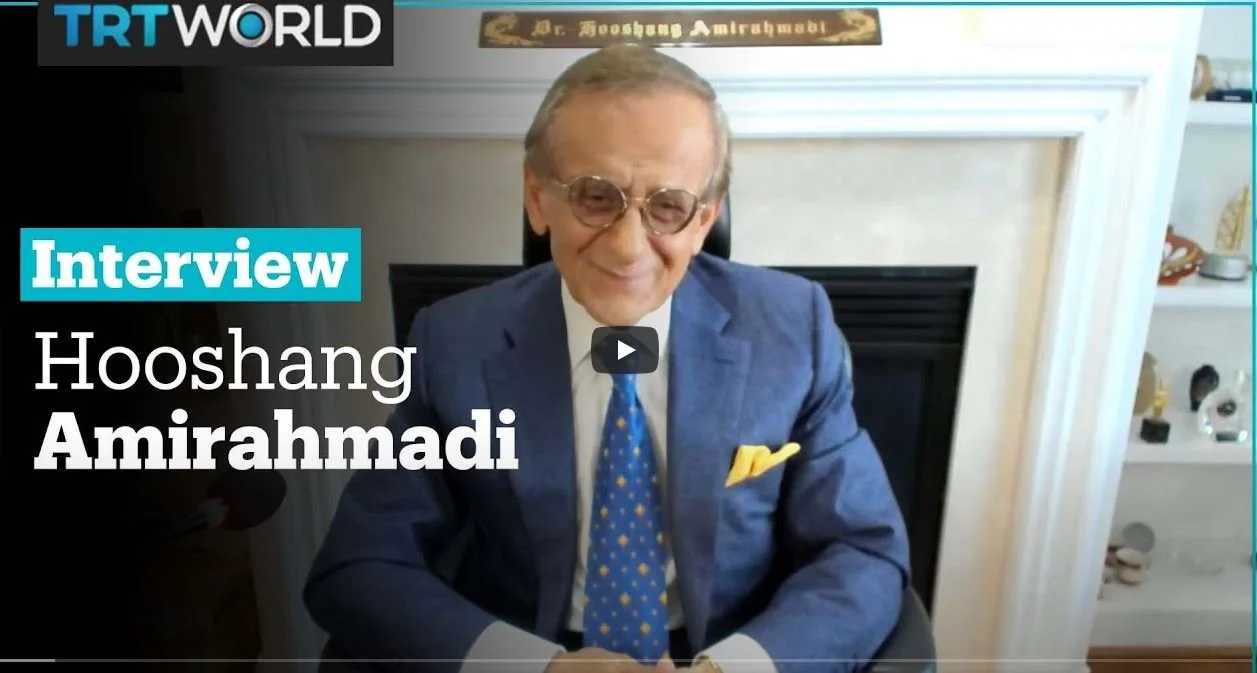
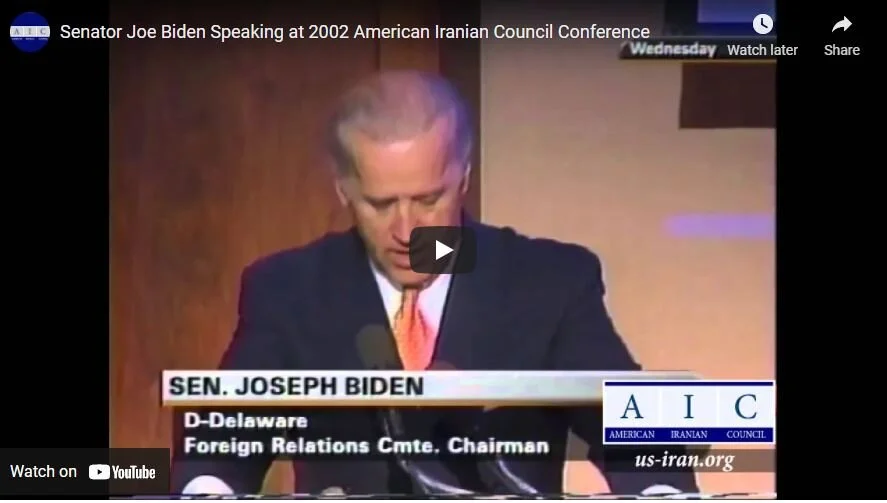











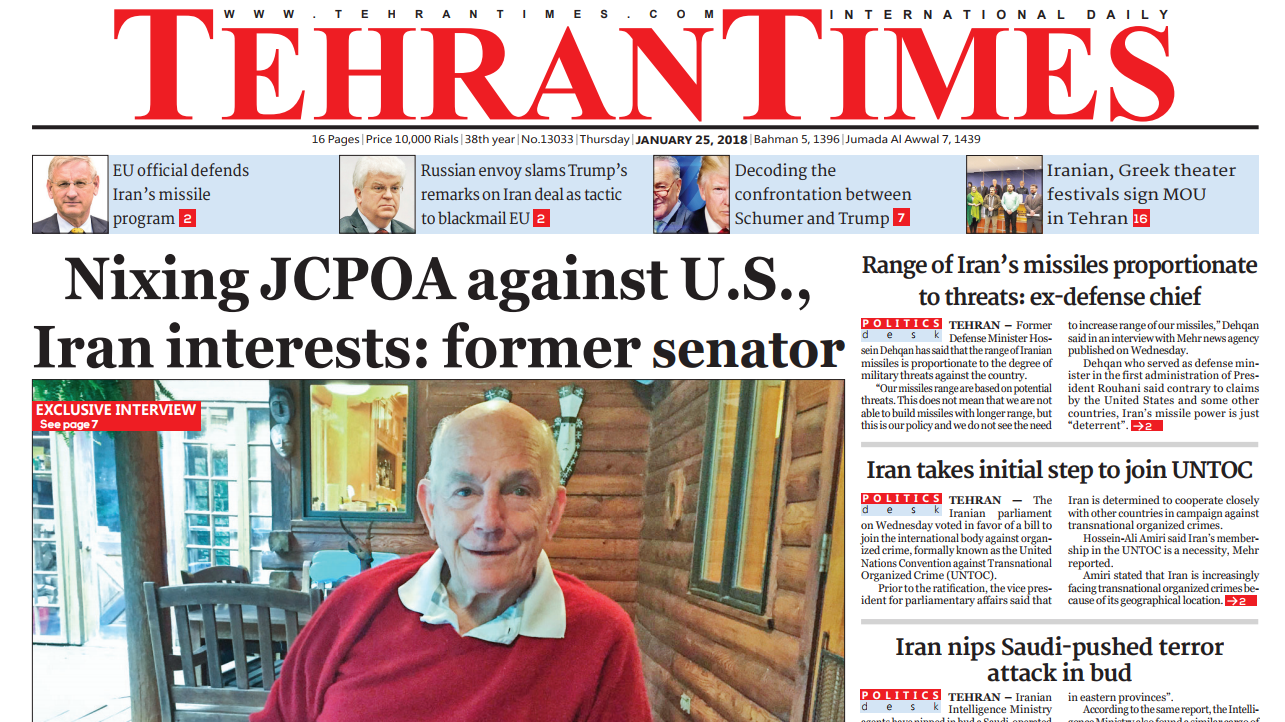







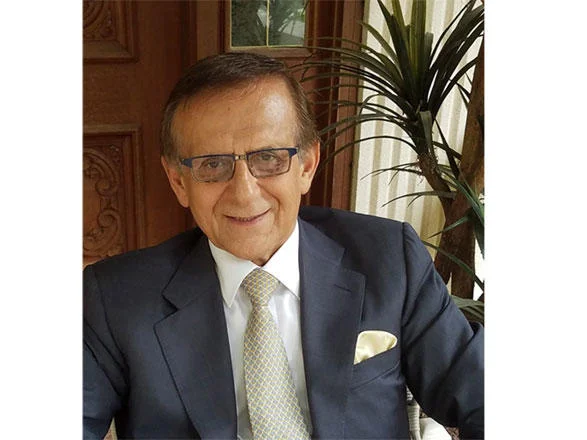

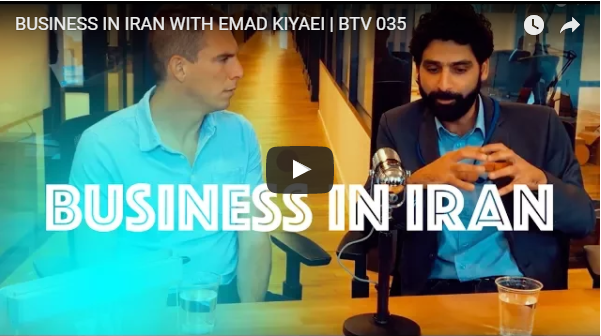





AIC’s President Dr. Amirahmadi presents his perspective on creating peace in the Middle East.